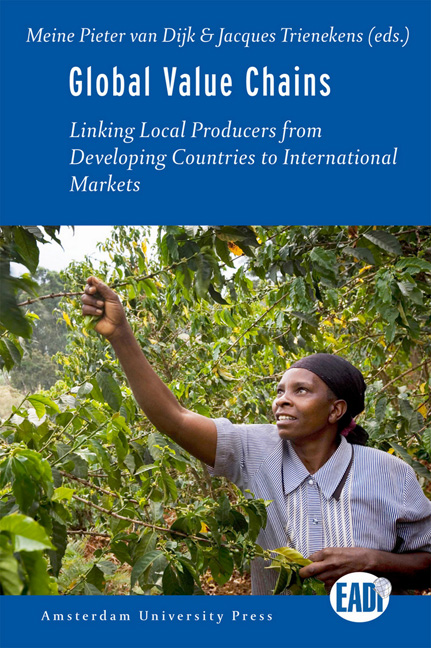Book contents
- Frontmatter
- Contents
- Part I Theoretical Contributions
- Part II Local Agricultural Value Chains
- Part III International Agricultural Value Chains
- Part IV Value Chains in the Industrial and Services Sector
- Part V Conclusions: Upgrading Value Chains in Developing Countries
- About the Authors
- Index
- Miscellaneous Endmatter
9 - Business-community Partnerships: The Link for Sustainable Local Development?
Published online by Cambridge University Press: 19 January 2021
- Frontmatter
- Contents
- Part I Theoretical Contributions
- Part II Local Agricultural Value Chains
- Part III International Agricultural Value Chains
- Part IV Value Chains in the Industrial and Services Sector
- Part V Conclusions: Upgrading Value Chains in Developing Countries
- About the Authors
- Index
- Miscellaneous Endmatter
Summary
Introduction
Governments in African countries are struggling on how best to focus on sustainable local economic development. How can communities benefit from investments within their area? What can the government do to promote linkages between the communities and business, and what can the communities themselves do to make effective use of local investments in their region? Partnerships are increasingly being promoted as vehicles for addressing development challenges. It is assumed that partnerships contribute to economic development when they are working towards a set of policies, programs, and activities which initiate and contribute to broader processes (Pfisterer et al., 2009).
There is need for further investigation on the outcomes and impacts of partnerships, as well as the factors contributing to their effectiveness. Although the concepts of partnership and sustainable development are linked discursively, there is little empirical evidence linking the two. It is only recently that empirical evidence for the effectiveness of partnerships in the field of development became a research focus. So far the range of assessments has given rise to contradictory assessments. Some cases provide best practices (Fiszbein and Lowden, 1999), while other studies analyze more critically the effectiveness of partnerships (Visseren-Hamakers et al., 2007). The understanding on how partnerships function and under what conditions needs to be enhanced.
Sustainable local development (SLD) is the central focus of this research. Local economic development is “a process in which partnerships between local governments, community and civic groups and the private sector are established to manage existing resources to create jobs and stimulate the economy of a well defined area” (Helmsing, 2003). It emphasizes local control, using the potentials of human, institutional, physical and natural resources (Rylance, 2008). Sustainability includes the concepts of intra- and intergenerational equity and quality of life (Warhurst, 2005). Sustainable development is development that meets the needs of the present while having the intent of allowing future generations to meet their needs as well (WCED, 1987). Aspects such as equitable access to quality education and health care, and the contribution of the partnership to environmental sustainability must be taken into account.
This study will assess community-business nature-based tourism partnerships in northern Tanzania.
- Type
- Chapter
- Information
- Global Value ChainsLinking Local Producers from Developing Countries to International Markets, pp. 201 - 234Publisher: Amsterdam University PressPrint publication year: 2012



